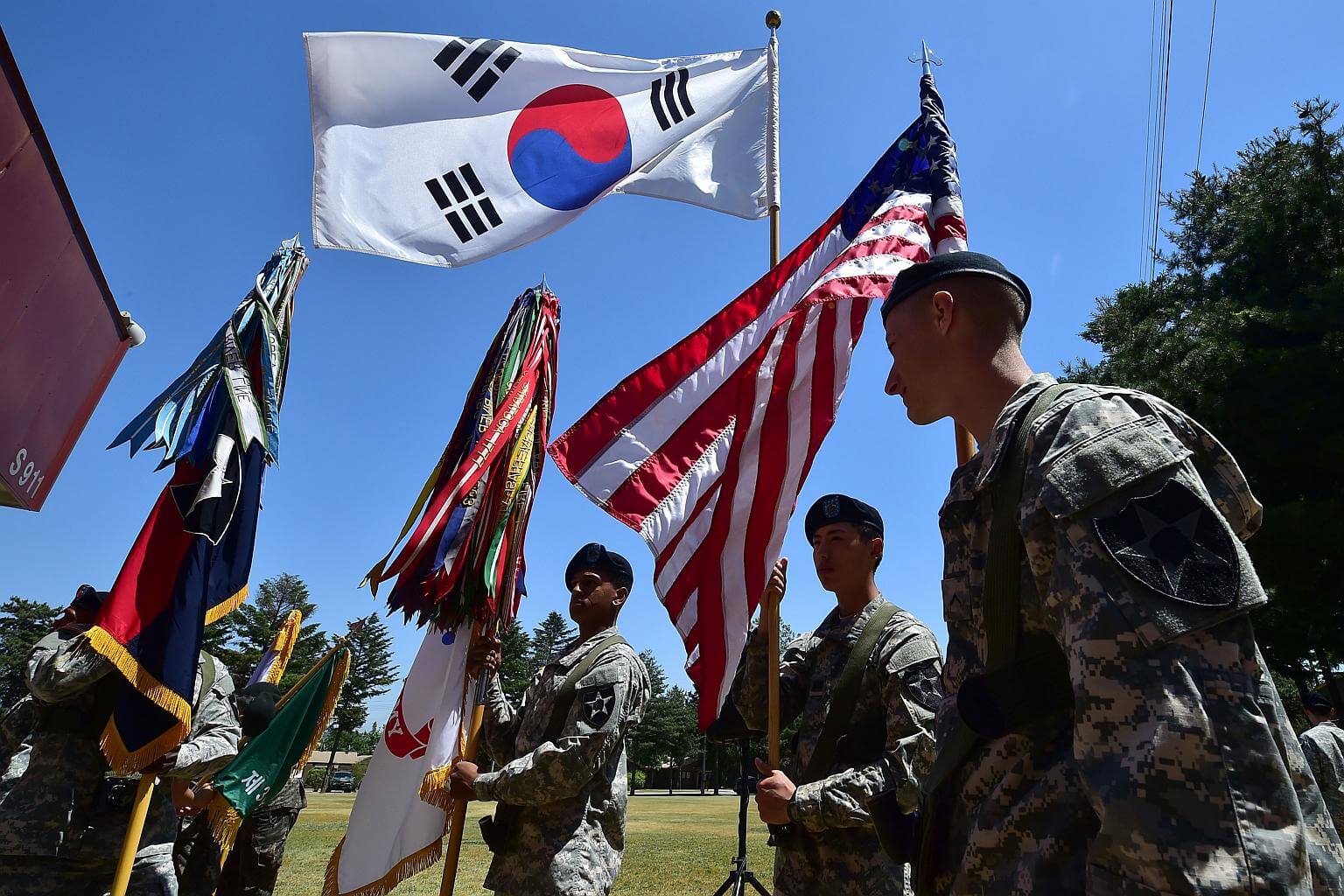Editorial Notes
South Korea pays more than 'peanuts' to host US troops: The Korea Herald
In its editorial on Jan 25, the paper speculates that United States Defence Secretary James Mattis' visit to South Korea heralds a hike in the cost of hosting American soldiers, and argues that South Korea has paid more than just "peanuts" for the troops thus far.
Sign up now: Get insights on Asia's fast-moving developments

US soldiers holding the flags of South Korea and the US before a South Korea-US Combined Division activation ceremony at an US Army base.
PHOTO: AFP
Follow topic:
News reports have said that United States Defence Secretary James Mattis plans to visit South Korea and Japan early next month. On the surface, the visit aims to reaffirm the solid US security alliance with the two countries, which Washington badly needs in light of its quickly deteriorating relations with China and the North Korean nuclear threat.
At the same time, there is a high possibility that Mr Mattis will use his first overseas trip since the inauguration of the Trump administration to follow up on Mr Trump's pledge to make traditional US allies like South Korea, Japan, Germany and Saudi Arabia pay more for stationing American troops on their land.
The "defence free riders" issue was one of the highlights of candidate Trump's "America First" election promises, with the former real estate mogul accusing allies of shunning their fair share of the costs for maintaining US forces which he said protect their countries.
Mr Trump mentioned the issue in his inaugural address: "For many decades, we've enriched foreign industry at the expense of American industry; subsidised the armies of other countries, while allowing for the very sad depletion of our military."
Mr Trump's key foreign policy and security aides like Mattis and Secretary of State Rex Tillerson also made it clear that they would follow up on the election pledge of their boss.
In his confirmation hearing, Mr Mattis said it was nothing new to ask allies to share benefits as well as burdens and that he would find common ground with allies.
"We have a long history in this city with presidents, secretaries of defence asking allies to carry their fair share of any kind of defence burden when they share in the benefits," he said.
It comes as a relief - from the perspective of the allies and more broadly global security - that neither Mr Trump nor his aides repeated the threats he had made during the campaign that the US should withdraw its troops if the allies refuse to shoulder more of the costs for hosting American forces.
Mattis said in the hearing that he knows of no plan to pull American troops out of South Korea and Japan and that the US would work closely with Seoul and other allies to counter growing nuclear and missile threats from North Korea.
But any such comment falls short of reassuring the allies, including South Korea, which Mr Trump pinpointed as a "free rider" several times during his campaign. South Korea should get itself ready for US demand to shoulder more costs for maintaining American troops.
First, efforts should be made so that Mr Trump and his foreign policy and security aides, as well as members of the US Congress, face the reality that South Korea is paying much more than the "peanuts" Mr Trump claimed regarding Seoul's contributions to the upkeep of US forces.
South Korea pays about half of the costs for maintaining the 28,000 American troops, which reached 944.1 billion won (S$1.1 billion) in 2016. The payment has gone up steadily - from 488.2 billion won in 2001 to 680.4 billion won in 2005 and 790.4 billion in 2010.
Former US Ambassador Mark Lippert was well timed to mention that South Korea picks up about 55 per cent of non-personnel costs for the US military and pays for more than 90 per cent of the Pyeongtaek base, the largest overseas US military facility where key units will be relocated. South Korea is also the only country that provides support personnel - the Korean Augmentation to the US Army - for which the Seoul government spends about 10 billion won each year.
One more thing to note when one counts "defence surplus and deficit" is the fact that South Korea is a major purchaser of US arms, having spent 36.4 trillion won on weapons and military equipment over the past 10 years.
More important is that there is more to security alliance than what can be counted by who pays how much. One good example is the role of US troops in South Korea and Japan vis-a-vis the rise of China.
The Korea Herald is a member of The Straits Times media partner Asia News Network, an alliance of 22 news media entities.

